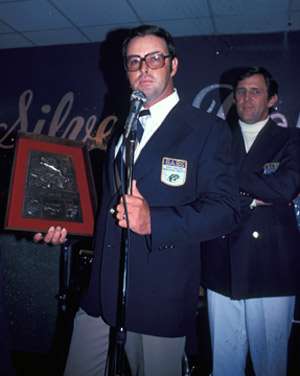
Bill Dance was professional bass fishing's first superstar. After a second-place finish in the first modern bass tournament — the 1967 All-American on Beaver Lake in Arkansas — the former furniture and hardware salesman from Memphis, Tenn., never looked back. He parlayed his tournament success into Bill Dance Outdoors, an immensely popular television fishing show that is still in production and still one of the most popular in the world.
Dance took the tournament world by storm. In just 78 career BASS events, Dance won nearly 10 percent of the tournaments he entered, finished in the Top 10 slightly more than half the time and won three coveted Angler of the Year awards (1970, 1974 and 1977). Along the way, he qualified for eight Bassmaster Classics — never winning, but finishing second in 1973 and in the top 10 four times.The road to a career in professional bass fishing and television was not a natural one for him. William George Dance, Jr., came from a family of physicians — five generations of them to be exact. But Bill couldn't stand the sight of blood, so he chose another path.Dance enrolled at the University of Tennessee in 1959 with no specific plan in mind for a career. When he met and married his wife, Dianne, he dropped out of school and took a job as a salesman in a furniture and hardware store.His sales job paid the bills, but fishing was Dance's passion. So when Ray Scott called to invite him to fish the All-American in 1967, Dance was ready. He finished second in that tournament and has the distinction of catching the first bass in the modern tournament era. Dance had borrowed a 60-hp motor and was decidedly faster than the other rigs in the competition. After motoring a short way from the launch, he stopped and cast a 7 1/2-inch blue Fliptail plastic worm toward the shore. A 2-pound bass engulfed it as soon as it hit the water. Less than a minute of competition time had passed.He finished second again at the next event on Alabama's Smith Lake, then went on a tear, winning three of the next four tournaments. In his first 19 professional tournaments, Dance won seven times and finished in the top four 14 times with his worst finish being 19th place. He was the undisputed king of bass fishing, capturing the very first Bassmaster Angler of the Year award in 1970 and winning it again in 1974 and 1977.And when he called it quits after the 1980 season, many were surprised. After all, the affable Tennessean was just 39 years old and still in his physical prime. Fans will have to speculate about what he might have done had he fished another decade or two.In the end, the demands of his television filming schedule and other business interests were simply too much to juggle along with a busy tournament season. To make things tougher, he and his wife were the parents of four young children "I was traveling so much that I really would wake up and not remember what city I was in," Dance explained at the time. "My hectic schedule was putting a terrible strain on my family — my number one priority. I hardly knew who they were."His fans never forgot him, though. At boat and tackle shows all around the country, Dance still draws the biggest crowds as thousands of supporters line up for autographs and photos. In 2005, Dance finished third in Bassmaster Magazine's Greatest Angler Debate behind Rick Clunn and Roland Martin, both of whom spent more than 30 years on the tournament trail. His strong showing showed not only the impact that his brief career had on the sport but also the passion of his many fans.
